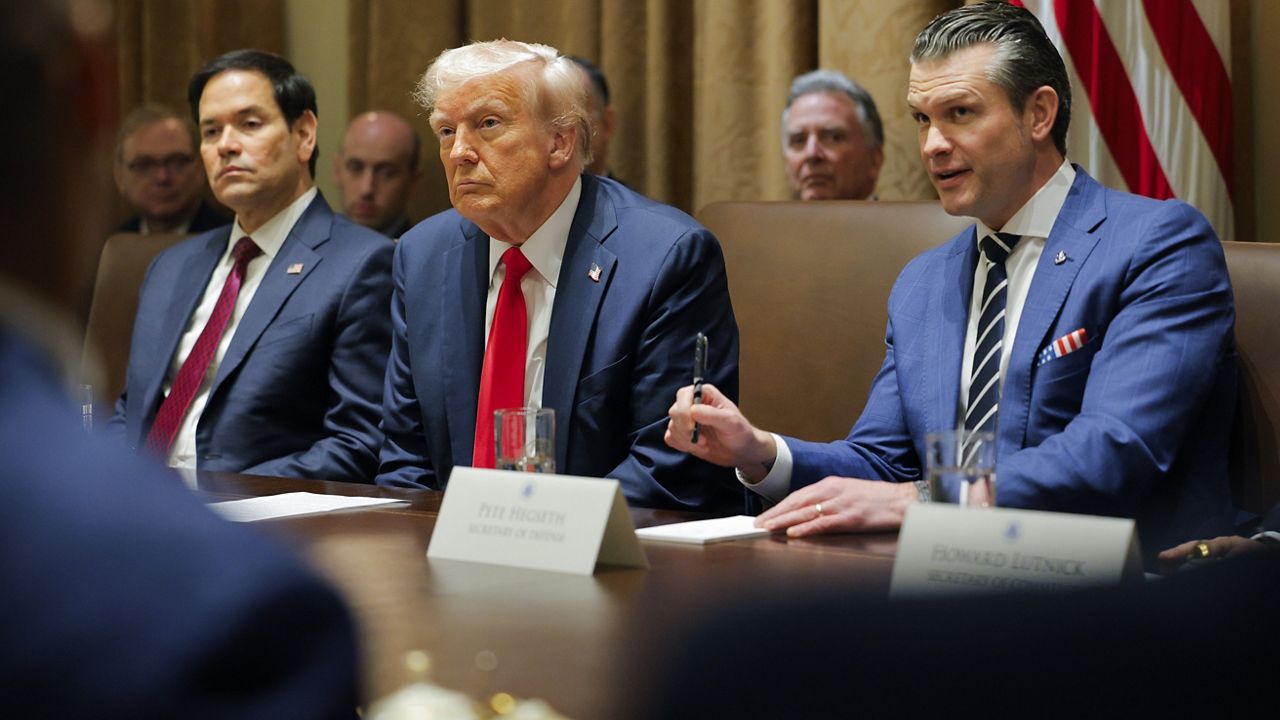A group of hard-line conservative House Republicans are urging Speaker Mike Johnson to renegotiate the roughly $1.6 trillion spending deal that he negotiated with Senate Majority Leader Chuck Schumer, D-N.Y., and announced over the weekend.
Members of the far-right House Freedom Caucus met with Johnson on Thursday, one day after 13 Republicans staged a revolt on the House floor, tanking a procedural vote on consideration of three bills. (The vote ultimately passed Thursday afternoon.)
Republicans killed a similar vote in June in protest of the compromise that then-Speaker Kevin McCarthy reached with President Joe Biden on a measure to suspend the debt limit.
GOP lawmakers told reporters after Thursday’s meeting that they were optimistic about the possibility of renegotiating the spending agreement. Members of the Freedom Caucus are pushing for steep spending cuts.
“There's going to be a new deal drawn up,” Georgia Rep. Marjorie Taylor Greene told reporters. “That's what we're in the process of doing.”
South Carolina Rep. Ralph Norman told reporters as he left the meeting that “it’s not going to be the current deal.”
But Johnson emphasized that he “made no commitments” as to walking away from, or adjusting, the deal he reached with Schumer.
“We're having thoughtful conversations about funding options and priorities,” Johnson told reporters. “We had a cross section of members in today. We’ll continue having cross sections of members in.”
“While those conversations are going on, I've made no commitments,” he continued. “So if you hear otherwise, it's just simply not true.”
At a news conference Thursday, Johnson’s Democratic counterpart, House Minority Leader Hakeem Jeffries, D-N.Y., charged that if the House GOP backs out of the agreement, it would cause a shutdown and devastate the country’s economy.
“To the extent that House Republicans back away from an agreement that was just announced a few days ago, it will make clear that House Republicans are determined to shut down the government, crash the economy and hurt the American people,” Jeffries said.
Senate Democrats forged ahead Thursday with the agreement struck with Johnson, while Republicans expressed skepticism about their House counterparts’ efforts to renegotiate the pact.
“We have a topline agreement,” Schumer said when asked about the possibility of Johnson pulling out of the agreement. “Everybody knows to get anything done it has to be bipartisan. So we’re going to continue to work to pass a [continuing resolution] and avoid a shutdown.”
"I urge my Republican colleagues in the Senate to work with us to keep this process moving quickly on the floor," the New York Democrat said, adding: ”the vast majority of us are all on the same page that a government shutdown would be a recipe of chaos."
Schumer’s GOP colleagues seemed lukewarm at best about the prospect of tweaking the budget deal.
Maine Sen. Susan Collins, the top Republican on the appropriations committee, told POLITICO that it would be “extremely difficult” to renegotiate the agreement.
“I certainly hope [Johnson mulling renegotiating the deal] is not true, because it increases the chances of a government shutdown,” Collins said.
“It’s usually a good idea to make a hard decision and get it behind you and move on to the next one, rather than try to reconsider the same decision over and over again,” Texas Sen. John Cornyn, a member of Senate GOP leadership, told the outlet.
North Carolina Sen Thom Tillis told Punchbowl News: “If Republicans want to snatch defeat from the jaws of victory in the election this year, fail to fund the government.”
“I don’t believe Speaker Johnson wants to shut down the government,” he told the outlet. “I do know there are people in his party who do, but they’re the same ones who were okay with us not having a speaker for … weeks, so I’m not particularly interested in their strategic advice.”
Hard-right lawmakers have expressed outrage over the budget deal in recent days, with some even floating the possibility of potentially moving to oust Johnson from his position as they did with McCarthy in October of last year. Under the deal McCarthy struck last January to secure the speaker’s gavel, any one member of the House can force a motion to remove the speaker. The House GOP majority is even narrower following recent departures of Republican lawmakers.
Greene told Axios that if bipartisan deals “are going to continue to be made, then absolutely that’s on the table,” while Texas Rep. Chip Roy said on The Steve Deace Show earlier this week that he’s “leaving [the option] on the table.”
“I'm not gonna say I'm gonna go file it tomorrow night. I'm not saying I'm not gonna file it tomorrow,” Roy said on the program. "I think the speaker needs to know that we're angry about it."
“If they totally botch [the appropriations bills], we get no policy reforms and we're spending at $1.66 trillion, I don't know why we would keep him as speaker,” he added.
Other lawmakers aren’t so quick to call for another motion to vacate. Arkansas Rep. Steve Womack told Axios there’s “little appetite” to oust Johnson from his role, but warned: “I didn't say there wouldn't be an effort to do a motion to vacate. I just don't think the House as a whole is going to accept that.”
“We've got a two-seat majority, this is a brand new speaker, we've got to ride the river with him for a little while,” Texas Rep. Brian Babbin told Axios.
Business in the House ground to a halt for weeks after McCarthy’s ouster after Republicans struggled to pick a speaker before selecting Johnson. The GOP’s margin in the House is even thinner following the resignation of McCarthy at the end of last year and the ouster of George Santos last month.









